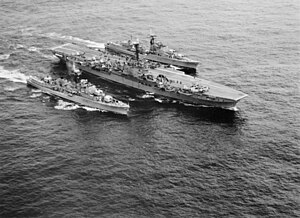 HMAS Voyager alongside HMAS Melbourne and HMAS Vendetta in 1959
| |
| History | |
|---|---|
| Builder | Cockatoo Docks and Engineering Company |
| Laid down | 10 October 1949 |
| Launched | 1 May 1952 |
| Commissioned | 12 February 1957 |
| Motto | "Quo Fata Vocant" (Where Fate Calls) |
| Honours and awards | Seven inherited battle honours |
| Fate | Sank following collision on 10 February 1964 |
| General characteristics | |
| Class and type | Daring-class destroyer |
| Displacement |
|
| Length | 390 ft (120 m) |
| Beam | 43 ft (13 m) |
| Draught | 12 ft 9 in (3.89 m) |
| Propulsion | 2 × Foster Wheeler boilers, 2 × English Electric geared steam turbines, two shafts, 54,000 hp |
| Speed | 33 knots (61 km/h; 38 mph) |
| Range | 3,700 nmi (6,900 km; 4,300 mi) at 20 knots (37 km/h; 23 mph) |
| Complement | 20 officers, 300 sailors |
| Armament |
|
| Notes | Taken from:[1] |
HMAS Voyager was a Daring-class destroyer of the Royal Australian Navy (RAN), that was lost in a collision in 1964.
Constructed between 1949 and 1957, Voyager was the first ship of her class to enter Australian service, and the first all-welded ship to be built in Australia. During her career, Voyager was deployed to the Far East Strategic Reserve on six occasions, but never fired a shot in anger.
During the night of 10 February 1964, Voyager and the aircraft carrier HMAS Melbourne collided off Jervis Bay, when the destroyer passed in front of the carrier during post-refit sea trials. Voyager was cut in two by the collision, sinking with the loss of 82 of the 314 people aboard. This was the largest loss of Australian military personnel in peacetime, and the subsequent investigations resulted in the holding of two Royal Commissions—the only time in Australian history this has occurred.
- ^ HMAS Voyager (II), Royal Australian Navy